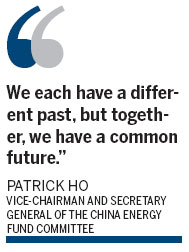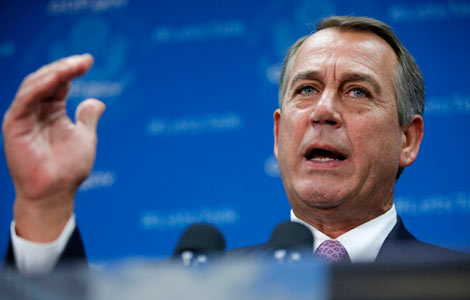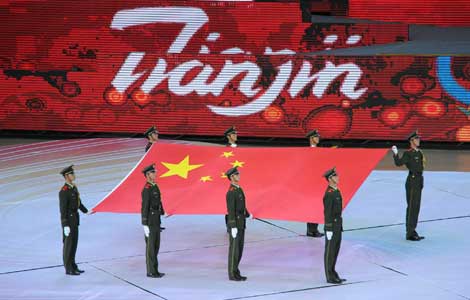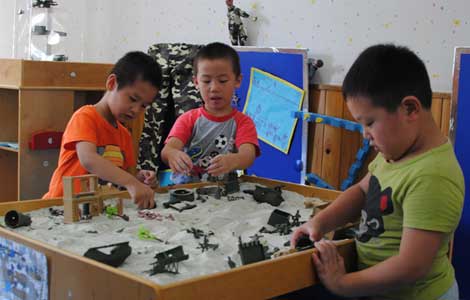Experts examine core values of China and US
Updated: 2013-10-07 11:08
By Chen Weihua in Washington (China Daily)
|
||||||||
With Chinese and US leaders vowing to defy historical precedents of clashes between rising powers and the existing powers, scholars from the two countries spent the weekend trying to defuse widely perceived tensions caused largely by different core values.
Patrick Ho, vice-chairman and secretary general of the China Energy Fund Committee, said a lot of people think that China will definitely seek hegemony with its rise.
"If you look at history, China has risen several times. Was there a time that China sought hegemony? None," Ho told China Daily after delivering his speech at the conference on core values and world order held on Friday and Saturday at the Carnegie Library in Washington DC.
Ho, a former secretary for home affairs of the Hong Kong Special Administrative Region's government, said Chinese and Americans are two very different peoples in terms of historical backgrounds and cultural core values.
"That speaks volumes of the importance of dialogue in facilitating mutual understanding. Dialogue is the only means through which disputes could be settled and mitigated," he said.
"We each have a different past, but together, we have a common future," Ho said.
He said the values of the East and the West are not incompatible and they constitute a set of values at the two ends of the spectrum, just like the yin and yang of tai chi, referring to Chinese shadow boxing.
"The two sets of values operate with one another as two opposing principles in nature complementing and supplementing one another. But one is be incomplete without the other," Ho said.
Ho believes that by combining the strength of the East and the West, people can make possible a multi-polar world order for the modern century.

It was the fourth session of the Sino-US colloquium sponsored by the China Energy Fund Committee. The previous three were held the past two years in Hong Kong with scholars talking about challenges and opportunities in energy cooperation, trust building and a trialogue with Japan.
Ji Baocheng, former president of the Renmin University of China, said peaceful development is an irreversible trend in globalization. "China and the US should embrace the spirit of 'agree to disagree' and accommodate each other's difference in order to seek common prosperity and social development," said Ji, referring to a Confucius saying that a gentleman gets along with others, even if he does not necessarily agree with them.
Bonnie Glaser, a senior advisor for Asia at the Center for Strategic and International Studies, said China, whose rise has benefited from the current international system, would not want to undermine the system. But she pointed out that China is not satisfied with the status quo and that means that China will seek to make changes.
Glaser believes a peaceful transition to a multi-polar world is possible and the dialogue on core values is an important part in promoting the peaceful transition.
China has stated for years that it is not seeking to change the international system, but a revision in some areas to evolve with the time is desirable since the current system is largely set by the West without the full participation of the developing world, including China.
Amitai Etzioni, professor of international affairs at George Washington University, said such a dialogue could help the East and West understand each other's core values, but the problem is how to find the balance between these civilizations.
Misperceptions abound between Chinese and Americans. A China Daily/Gallup survey last year found that Americans are split in their views of China. Forty-two percent of Americans and 49 percent opinion leaders have a favorable view of China while 44 percent of the public and 40 percent of opinion leaders hold an unfavorable view. The rest of the respondents were undecided.
At the same time, a China Daily/Horizon survey shows "the hegemony by the US on other countries" has become a major factor affecting Chinese citizens' attitudes towards the US.
chenweihua@chinadailyusa.com
(China Daily USA 10/07/2013 page8)
Most Viewed
Editor's Picks

|

|

|

|

|

|
Today's Top News
Academics evaluate China at conference
Experts examine core values of China, US
China needs to export ‘public goods’: expert
Sowing the seeds of new business
Chinese investors visit Silicon Valley
Two Chinese die in plane crash near Saipan
Destroying Syria's gas arms started
Direction charted to resolve disputes
US Weekly

|

|














